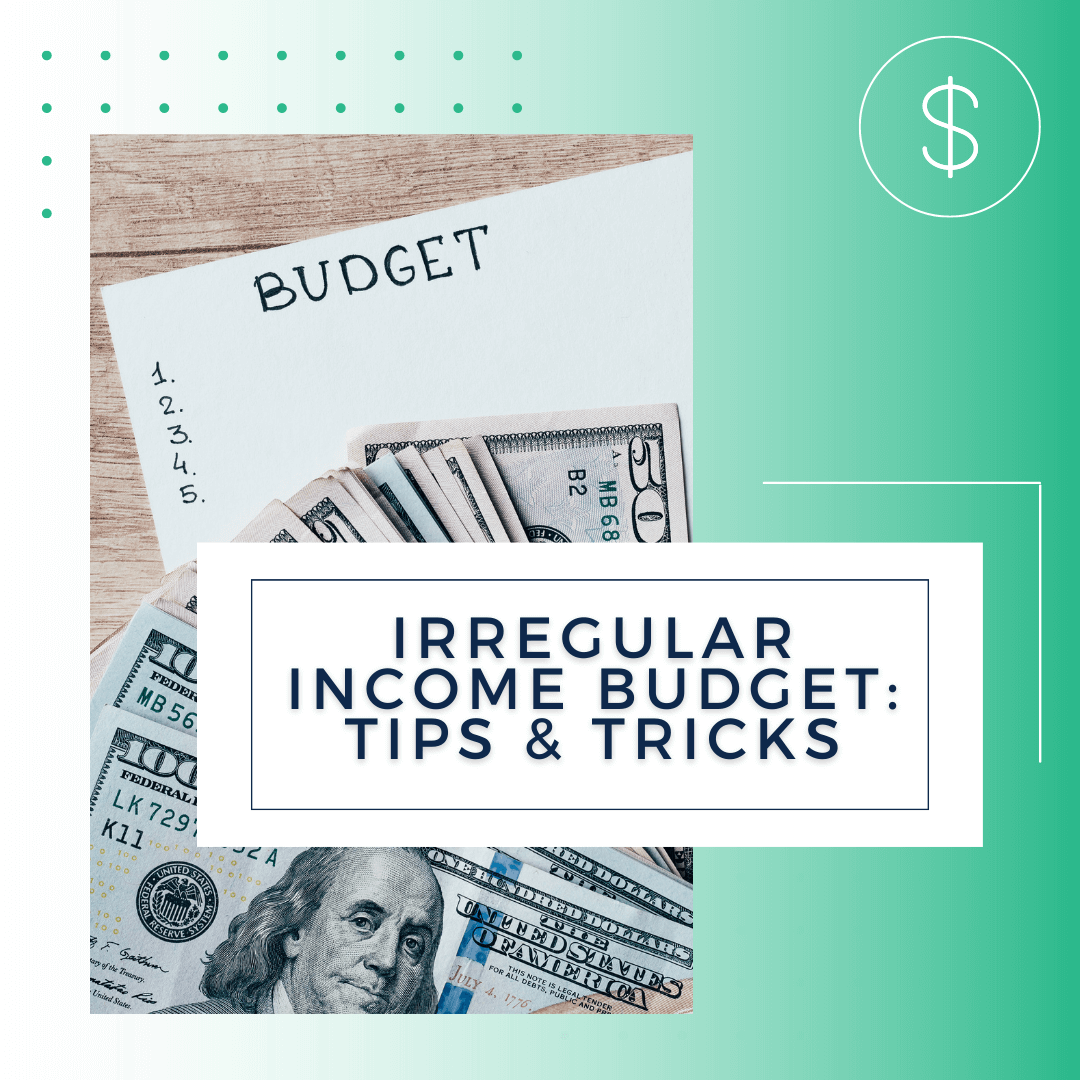
Irregular Income Budget: Tips & Tricks
You might work as a self-employed person, a small business owner, or in a profession that pays inconsistently. You’ll find your earnings swinging wildly from one month to the next.
The ins and outs of an irregular income budget will be covered in this blog post. Together, we’ll uncover the challenges and arm you with some nifty tips and tricks to keep your finances in check.
Irregular income, in essence, doesn’t come in a predictable, set amount each payday. Deciding how much to spend when your incomes varies a lot is like playing financial roulette—you might find yourself rolling in dough one month and just rolling your eyes at your bank balance the next. It’s this fluctuation that can make budgeting feel a bit like a juggling act.
It’s a game we can all win if we take the appropriate attitude! Let’s dig deeper into how to budget with an irregular income.
Importance of Budgeting with Irregular Income
When you’re dealing with a fluctuating income, budgeting becomes your personal financial GPS. It’s what helps you navigate through the dense fog of income unpredictability and find your way to the serene shores of financial stability.
Without a budget, those without a steady income are all too vulnerable to our income’s ups and downs. Picture it: one month, you’re floating on cloud nine; the next, you’re down in the dumps, squeezing every penny to meet your monthly expenses and financial obligations. This yo-yoing can exacerbate stress and, in the worst case, result in serious financial issues that are challenging to overcome.
Key Takeaway: Budgeting without a regular paycheck is essential in helping you manage and control your finances, particularly when it comes to managing unexpected expenses. It can provide stability and peace of mind amidst the chaos of unpredictable income.
Setting up your Base Budget
Setting up a base budget is our first line of defense against the uncertainties of an irregular income. Picture it like a lifeboat on the choppy seas of financial unpredictability—without it, we’re simply drifting at the mercy of the waves.
This base budget should cover the fundamental elements of our daily living—expenses that, whether we like it or not, we simply can’t avoid. To give you an idea, here is what these core pillars typically include.
- Housing: This could be your rent or mortgage payment. The Fed – Housing said that the median rent in the U.S. as of 2022 was $1,000 per month, while the median monthly mortgage payment was $1,400.
- Food and groceries: The average American household spends approximately $4,643 on groceries each year—that’s about $387 a month.
- Utilities: These costs can include electricity, water, gas, and internet. On average, Americans spend around $290 per month on utilities.
- Transportation: Whether you’re making car payments or using public transit, getting from point A to B isn’t free. The average monthly car payment for a new vehicle is $563, or $397 for a used vehicle. If you ride buses and trains, what you pay might change a lot based on where your home is.
- Debts: Debts like student loans and credit card debt can be a significant chunk of your monthly budget. As of 2021, the average student loan payment ranged between $200 to $299 per month.
Now comes the pivotal part of setting up your base budget: instead of using your average income as main reference, you should use use your lowest-expected monthly income as a benchmark. This approach, while seemingly stringent, is your financial safety net. It’s your buffer against those months when your income dips, ensuring you can still cover your essential expenses without panicking or going into debt.
Key Takeaway: Setting up a base budget is essential when budgeting with irregular income. It should cover all the essentials like housing, food and groceries, utilities, transportation, and debts—while using your lowest-expected monthly income as a benchmark. This provides you with financial stability and peace of mind in case of an unexpected dip in your income.
Creating an Emergency Fund
Let’s now talk about another financial safety measure—an emergency fund. Think of this fund as your personal superhero, ready to swoop in and save the day when unexpected costs, like medical bills or sudden home repairs, pop up.
According to a report from the Federal Reserve, 40% of Americans would struggle to cover an unexpected $400 expense without borrowing or selling something.
Building an emergency fund with an irregular income can feel like scaling a mountain, but remember, every step counts. Start with what you can and add to it each month. Even a small amount can be really helpful in a crisis.
Consider opening a bank account to use just for your emergency fund.
Key Takeaway: An emergency fund is a crucial part of budgeting with irregular income. It gives you peace of mind, providing financial stability and security in case of unforeseen costs. Start small and add to it each month—even a little will go a long way!
Prioritizing Expenditures
Next up, we have expenditure prioritization. In simpler terms, this means putting needs before wants. It’s a bit like packing for a trip—you wouldn’t pack your suitcase with just party dresses if you’re going hiking, right?
The same goes for spending money on things that aren’t necessary when you have basic requirements to take care of.
During lean months, consider trimming back on non-essential expenses. This could look like:
- Cooking meals at home instead of ordering takeout
- Borrowing books from the library instead of buying them
- Having a home movie night instead of hitting the theater
Remember, small changes can lead to significant savings.
Key Takeaway: Expenditure prioritization is an important aspect of budgeting with irregular income. It involves putting needs before wants and being mindful of what you’re spending money on, especially during lean months. Consider cutting back on non-essential expenses such as takeout, books, and movie tickets to save more money.
Saving During Peak Earning Periods
During peak earning periods, our minds might naturally wander to the land of the latest tech gadgets, luxury vacations, or even just some delicious takeout from our favorite restaurant. After all, you’ve worked hard—you deserve a treat, right? While there’s nothing wrong with celebrating your successes, the key here is moderation and foresight.
Instead of spending that extra income, think about saving or investing it. Although it might not sound as fun as going on a shopping binge, your future self will thank you. Here is what this could look like.
- Boosting your emergency fund: According to a report from Bankrate, only 39% of Americans would be able to cover a $1,000 emergency with savings. Adding to your emergency fund during peak earning months can help ensure you’re part of that statistic.
- Investing in a retirement account: Be it a 401(k), an IRA, or some other kind of retirement savings, investing can make your savings balloon over time, thanks to compound interest. Just consider this: if you’re 30 years old now and contribute $500 a month into a retirement account with an average annual return of 7%, you could have over $.2 million by the time you’re 65.
- Paying off debt: If you have outstanding debts, using your extra income to pay these down can save you a significant amount in interest payments over time. Remember, the average credit card interest rate in the U.S. is about 1.65% as of 2023, so paying off those balances can lead to substantial savings.
The secret here is adopting a future-focused mindset. Think about your long-term objectives when your income peaks. Visualize your future—do you see financial stability, a comfortable retirement, and freedom from debt?
Key Takeaway: Saving during peak earning periods is an important part of budgeting with irregular income. Instead of spending the extra money, consider boosting your emergency fund, investing in a retirement account, and paying off debt. Adopting a future-focused mindset can help you make informed decisions and work towards long-term objectives like financial stability and freedom from debt.
Read More: The Best Ways to Cut Costs and Boost Savings
Utilizing Budgeting Tools and Apps
Managing an irregular income can feel like trying to tame a wild horse—but luckily, we have technology on our side! There are oodles of budgeting tools and apps that can simplify money management.
Let’s look at what these digital marvels can offer.
- Spending Tracker: This tool allows you to log every expense, offering you an intimate view of where your money is going. Research indicates that people who track their spending can reduce their spending by up to 20%.
- Saving Goals: One of the best ways to save is by setting clear, measurable goals. And guess what? You can achieve that with the use of specific tools! By inputting your saving target and timeframe, these tools can help you track your progress and stay motivated.
- Budget Alerts: These nifty alerts gently nudge you when you’re nearing your budget limit or if you’ve strayed off the budgeting path. It’s like having a mini financial advisor in your pocket!
By utilizing the resources at your disposal, you demonstrate good resourcefulness rather than poor money management. So, go ahead and embrace technology; let it lighten your financial load. After all, budgeting should be a tool of empowerment, not a source of stress.
Key Takeaway: Utilizing budgeting tools and apps can greatly simplify the process of budgeting with an irregular income. Digital marvels such as spending trackers, saving goals, and budget alerts can help you take control of your finances and stay motivated while managing an irregular income. By embracing technology, you demonstrate resourcefulness rather than poor money management.
To Sum It Up
And there we have it, your handy guide to managing an irregular income. Sure, it can feel like navigating a maze at times, but with some careful planning, a healthy dose of discipline, and a sprinkle of patience, you can find your way through.
Remember, budgeting is not a restriction—it’s your ticket to financial freedom. It’s about taking charge, exercising good judgment, and creating a stable financial future. So, embrace these tips and make them work for you. Your wallet, and indeed your future self, will be eternally grateful!







Sorry, the comment form is closed at this time.